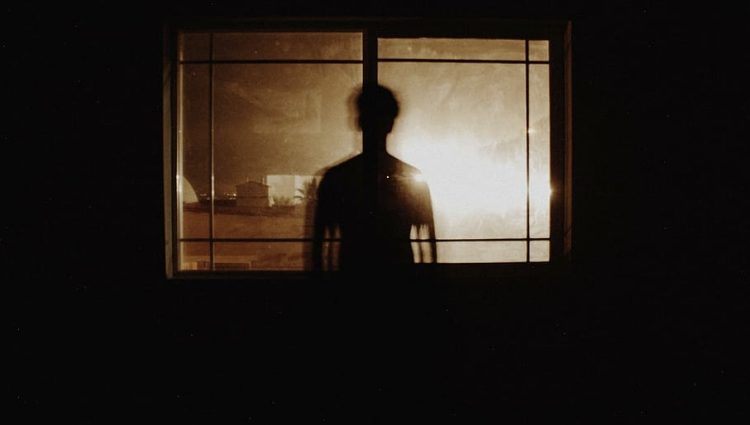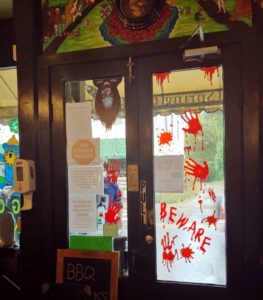
As the young woman walks away, Tim points to my beer,
“You’re almost done with that. I’ll get you another. You’ll want it for what I am about to tell you.”
“Great. Thanks!” I holler as I throw back my first gooey cheese stick. I’m enjoying the conversation and wondering what I am about to learn. After a few minutes, Tim comes back with my beer and sits across from me. He leans in, raises an eyebrow, and speaks in a somewhat hushed, gruff tone.
“There’s a secret to this building. And it starts down there,” he says pointing downward, “in the basement pitted beneath the rock and brick that hold up this structure. And if you care to hear it, then follow me.”
I sit back a little and wrestle with my decision. “I’m ready,” I tell him.
Tim and I leave the table and stroll casually downstairs to the dark place. He flips a switch and we sit down as he proceeds to unravel Bob’s story:
“Well, now, this dark space is cooled by the ground and neighboring creek. Back in the 1960s, here in this rural mountain community, this basement was a gay bar, like a speakeasy. As you can see,” he said, swaying his arm with a wide gesture, “complete with colorful fish painted on the walls.”
“I reckon you could imagine,” he continued, “the queer lifestyle wasn’t popular in these hills some sixty years ago. Of course, times have changed now, but back then this speakeasy was a second home to folks in this Blue Ridge area – probably the only space of self-expression, acceptance, and belonging this community had during that time. One of the regulars of this basement gathering was a queer man Amanda and I call “Bob.” Well, Bob was from a neighboring valley up Max Patch way,” said Tim.
“Max Patch?” I query.
“Max Patch is a bald mountain landmark along the Tennessee and North Carolina section of the Appalachian Trail,” Tim continues. “Now, Bob, in his mortal life, was a kind soul trying to figure out his identity in a land he loved and a community he cared about – especially those who accepted him for who he was. He came alive in the speakeasy where all his worldly burdens were stripped away. Why, I imagine he enjoyed philosophical conversations, had a few drinks and bites of food in a shared community. He likely brightened people’s day with jokes and funny anecdotes about life in the mountains.”
“Well, this here gathering place was kept a secret for a good long while, but, over time, rumors of the speakeasy moved casually through town and the surrounding valley communities. One night, as a harvest moon hung in the sky while starlight gave to the rising colors of dawn, a local spotted Bob leaving the basement hangout. He’d been very careful his whole life to keep his queerness private and close to the vest. As you can imagine in those times, he only let a very select group of family and friends know about his orientation, fearing the repercussions that would follow if his secret was out. Most of his loved ones and acquaintances had no idea. No idea at all. On that fateful morning, however, as folks woke up to gather their crops and prepare for the coming winter, Bob was spotted – he was outed. Well, tongues got to wagging and news quickly spread of the revelation across town and the surrounding hollers.”
“Oh, man,” I murmur, “What happened next?”
“Well,” Tim responds,” depends on who you ask. Let’s go on back upstairs to your table. I’ll check on a few things inside and bring you another Zombie before we continue.”
Tim leads me upstairs and proceeds to his managing duties while I sit at the table and contemplate about Bob, about life back then for a gay man compared to today’s LGBTQ community. I have to admit, my curiosity is piqued. I’m in the presence of a master storyteller. Tim returns, Zombie in hand, and continues Bob’s story,
“Now, there’s two competing stories regarding Bob’s fate, you know, and no one is really sure which one’s the truth. In essence, one day he was here, the next he was gone – poof – his time had come. Well, the first story proposes that Bob couldn’t deal with the stress of being ‘out.’ He wasn’t ready; perhaps he never would’ve been. But he was humiliated, and, as that feeling built, so, too, did his sadness. He likely thought he couldn’t go on, but decided to have one last night at the speakeasy. I’m getting ahead of myself here a little, so bear with me,”
I take another drink then lean forward with my elbows propped on the table. Tim goes on,
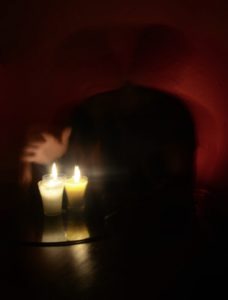
“They say he was full of joy and salud, that he hugged his community and lived life as a human one last time in this tavern’s basement. After he said his goodbyes, Bob, as the story goes, returned home without bothering to close the door behind him. Now, Grant, you said you and your family’s been coming here for years. So, you know the fresh feeling of the cool, crisp nights here. That night for Bob the cool night felt ‘present,’ and he longed to feel the air wash across his skin. Satisfied with his goodbyes, he lit candles and let his sadness go. Flickering illuminations created a space of peace in his home. Now, I imagine that was a peace he’d never really felt before. Folks say Bob reached inside an old trunk, retrieved a rope, and steadily threw it over a wooden beam that traversed his humble living space. He made a noose, climbed onto a chair, then fit the noose over his neck. The wind appeared from the open door, blew out the candles, then left as quickly as it arrived. The space was left tranquil and peaceful. I reckon for the first time in his life, Bob had no fear – so he decided to fly. He didn’t fear the reaper that night and waved goodbye to the mortal realm.”
“Oh, man,” I sigh heavily. “How tragic.”
“It is,” Tim sadly replies, “but . . . I prefer that story to the other one.”
A server approaches Tim and tells him they have a problem in the kitchen. Tim excuses himself for a minute or two. I sit drinking the Zombie cocktail for a while and, as my head reaches that sweet moment of being tipsy, yet not being drunk, I look at the dancing bears on the wall and think of the gatherings in the basement. I picture a happy crowd of people talking, dancing, laughing, singing. Tim walks back to the table and sits down again.
“So,” I say, “You said there’s a second story that’s worse than the first?”
“Well,” Tim says, “some think Bob wasn’t in charge of his own fate at all. Under another harvest moon, and after being outed, he might’ve kept some cover as he entered the speakeasy. The regulars likely knew what had happened and did their best to comfort and console him by offering support or praise. All the sadness Bob felt, all the embarrassment, washed away with his friends in the speakeasy that night. As the morning hours crept across the town, Bob left his basement community for a walk home. On this night, however, after hours of drinks, hugs, pats on the back, and loving kindness, he looked forward to the walk. The activity allowed him time to clear his mind and simply embrace what he couldn’t change.”
“Now, just outside the town’s limits, about an hour or so before the light of dawn, they say, Bob heard some clicks and rustling from the bushes. A little frightened, he turned to see what was there, but found nothing. Overhead, the harvest moon threw light across knotted trees and wrangled shrubs. A soft autumn breeze moved tall grass in a pleasing rhythm, rustling and dancing across the hour. Bob breathed deep, closed his eyes, and enjoyed a moment of peace. He opened his eyes and stared again at the beautiful mountain night. Now here’s where it gets bad, you see, because, when Bob turned to continue his walk, he stopped dead in his tracks.”
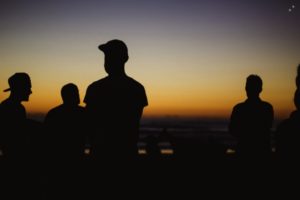
“Noctilucent clouds shone on the distant field; the grass still swayed; the wind still blew, but the air? Well, the air felt as cold as an ice cube. In front of him stood some men chewing tobacco and grinning maliciously. Folks who believe this version of the story say Bob knew he was in danger and turned to run back to town. In a quick change of direction, he never realized they’d surrounded him. One of the men tripped Bob, who fell to the ground. My opinion is – I think Bob knew he faced a violent end there that night. People said as he was clubbed, kicked, spat on, and beaten; that he absorbed the blows and barely noticed the tobacco juice stinging his eyes. A spreading calm came over him as he bathed in the harvest moonlight. In the end, he never feared the reaper.”
After a pause, Tim continues in a soft, scratchy voice,
“You know . . . I really like Bob.”
“Yeah, I bet knowing that history makes you feel some sort of connection with him.” As I close my statement, I take another sip of beer.
“Well, truthfully, I liked Bob before I even knew the story.”
“Hmm,” I’m confused, but curious. “How so?”
“Bob’s spirit is tied to the building. He loved it here, and, as his life ended early, I guess he decided to spend some more time, as a spirit here – he makes his presence felt.”
“Really?” I’m engrossed by the story, and I can tell Tim is dead serious. “Are you implying that this tavern is haunted?”
“I’m not implying at all; I’m letting you know that it is.”
Since Tim and Amanda have owned this place, they, their employees, and several locals have experienced strange, unexplainable phenomena. Items, such as plates, silverware, Texas toast, even spices, fly right off the shelves and crash to the floor. Occasionally, the stereo will turn itself on and off, or the knob that controls the volume will turn in mid air blasting music as loud as possible across the tavern. To this day, an antique desk, a remnant from the old speakeasy, still sits in the basement. In the late night or early morning hours, when folks are near the wooden piece of mid-century furniture, they’ve heard heavy footsteps, as if someone is stomping atop the old workspace. Tim has also experienced this and carried prolonged cold chills afterward.
Spring Creek Tavern has a wood burning oven that produces amazing pizzas. In the kitchen, a white sheet-like pan holds all the dough for their pies. One night, an All Hallows Eve to be exact, Tim was working in the kitchen with one of his cooks, called Cowboy. Cowboy was pitching some flour and yeast as he rolled out dough on a work bench. Tim was enjoying a quick conversation with him, when the white tray above the dough-making station caught his attention. Tim couldn’t really tell what made him look up at the tray; perhaps it was shimmering, or appeared translucent, but, soon after he set his gaze on the tray, it mysteriously lifted and hovered in mid-air. Cowboy jumped backwards from the pizza station and his back hit the wall behind him. Shaking, Tim and Cowboy made eye contact, and then flinched as the tray smashed into the wall next to Cowboy’s head.
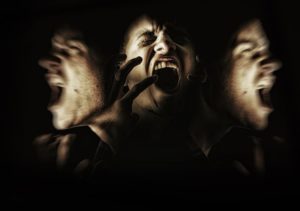
Startled, the two yelled, catching the attention of Amanda who was wiping down the front door. When she turned back to the kitchen, a blue flannel shirt floated from the kitchen entrance. The shirt, appearing to move in stop motion, drifted behind the bar. Not knowing what to do, Amanda ran towards the shirt as Tim and Cowboy exited the kitchen. Like a phantom, the shirt vanished in thin air.
“There have been other close encounters over the years,” Tim tells me as he scratches his beard. “This same blue flannel has been seen floating in the bathroom. And sometimes, at night, the place just feels different – kind of eerie, but we don’t feel in danger at all.”
“Even after having a pizza tray tossed at you?” I ask.
“You know, it’s kind of odd, but that’s the night we named his spirit. Started calling him ‘Bob.’ Once we gave him a name, he was never violent towards us again. So, we talk to him, and try to be respectful.”
“He doesn’t mind harming your property, though,” I point out, “throwing your spices and plates and stuff around.”
“True, but when that stuff happens now, we just chuckle and say, ‘alright Bob’ to let him know we’re thinking about him.” With a sigh, Tim smiles and follows up: “He just doesn’t want to fade away – he wants to keep being mentioned and he reminds us every once in a while.”
“Huh,” I respond, not sure if I believe all of this has actually happened. “I reckon the reason you have that skeleton monument dressed in a blue flannel is because that’s what you’ve seen his spirit wear, huh?”
“Blue flannel?” Tim raises his eyebrow, and a puzzled look graces his face. “Bob’s skeleton is wearing a biker’s vest.”
“I don’t think so, man.” Equally puzzled, I pull out my phone and review my picture. “What the hell?” Sure enough, in my photo, Bob wears a vest.
“I swear this skeleton was in a blue flannel shirt! I really liked the mother of pearl buttons,” I respond with a hint of panic in my voice.
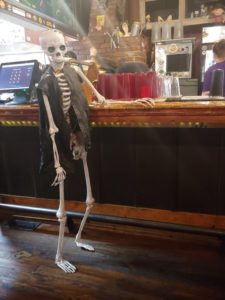
Tim and I pop out of our chairs and move into the tavern. Without a doubt, the skeleton stands at the wooden bar in a vest. I cannot tell if my mind is playing tricks on me or not, but I can tell Tim is just as creeped out as me. Whatever the illusion, the skeleton seems to move without moving . . . but the jawline . . . is he smiling at us?
“Can I get you another Zombie?” My server asks excitedly as she approaches Tim and me. We jump at the sound of her question; this breaks our trance.
“No. No thank you. I should tab out and be on my way,” I respond shakily. I turn my attention back to Tim as she walks away. “That was weird.”
“That’s Bob!” Tim responds with a laugh. “I better get back at it. Enjoy your stay and come back to see us anytime!”
Over the next couple of days, the vacation with my family unfolds without a hitch. The rain rolled right on out of the area over the weekend, awarding us wistful soft clouds among royal blue skies. We hiked through the one-hundred-acre wood, watched the colorful leaves flitter and bounce in the autumn air, and enjoyed the sparkling water of the French Broad River under the sun. Our evenings were spent reading stories in our primitive cabin, and our nights were lit by campfire. And, yes, we did dine at the Spring Creek Tavern a couple more times for lunch over the break.
This Wednesday morning, however, we need to leave. Time to dash back to Knoxville for a workday; fall break is officially over. We woke up rather early to pack everything. With the final sweep of our cabin done, we leave the mountain town. The weather is beautiful and mild – everything one could wish for out of an autumn day. As I turn onto to Highway 25 and cruise up the hill away from town, I look back again to a bird’s eye view of our getaway. The sky is a cerulean blue, a white fog from the French Broad puffs through the valley, and I smile knowing that when I come back next year, I’ll have to let Bob know I’ve been thinking about him.
**Featured image by Isai Ramos from Unsplash
